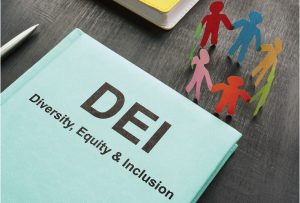
Diversity & Inclusion – By Shawn Andrews, Ed.D., MBA
Specific behaviors help you create a diverse and equitable workplace
 Still today, most decisionmaking leadership positions (in nearly all industries) are held by men. Men are a key piece of diversity, equity and inclusion (DEI) and the gender puzzle because of their outsized impact on the lives of thousands of workers.
Still today, most decisionmaking leadership positions (in nearly all industries) are held by men. Men are a key piece of diversity, equity and inclusion (DEI) and the gender puzzle because of their outsized impact on the lives of thousands of workers.
There’s been more focus recently on how men can be both better allies and more inclusive leaders. The fact is, we will not attain gender parity or inclusive cultures without men on board. We won’t even get close.
Here’s the good news – studies show that most men want to learn how to be an inclusive leader, but they lack the support and skills to do so.
Inclusive Leadership
To be an inclusive leader (for men or women), there are specific behaviors that can help you create more diverse and equitable work environments that are psychologically safe for all employees. For example:
- Being receptive and willing to learn about DEI
- Respecting and valuing those who are different than you
- Building trust and relatedness within your team
- Building trust and relatedness within your team
- Keeping people in the loop
- Being consistent in your behaviors
- Asking for and giving feedback
- Giving credit
- Providing opportunities
- Listening and showing empathy
These are just some of the many things we can do to help employees feel valued and safe enough to speak up, contribute their ideas, take risks and feel that they belong. Our brains function much more efficiently and creatively with a lack of social threats.
In other words, the culture needs to be inclusive.
Gender Advocate
Men are essential in helping close the leadership gender gap. Here’s more good news – there are many things that men can do to support women’s careers. Men can actively:
- Hire
- Mentor
- Sponsor
- Coach
- Include
- Develop
- Listen to
- Promote
Men play a pivotal role in creating workplaces where women – and people of color– can thrive. And they can be an example to other men!
7 Superpowers of Men
But it doesn’t stop there. Men can also leverage their unique skills, or superpowers, to help them be a better allies and more inclusive leaders. These superpowers stem from both nature (how our brains are wired) and nurture (how we’re socialized) and are distinct to each gender.
- Risk-Taking – It perhaps comes as no surprise that men are generally bigger risk-takers than women. Brain wiring has a lot to do with it, as does testosterone. One question that I often ask audiences is, “When your boss asks you to do something you’ve never done, what do you say?” Most men respond, “I got it and I’m on it.” Even though they don’t know how to do it, they figure it out, and nine times out of 10, this strategy works. Men have the same worries that women do, they just don’t admit it. What’s the result? Data shows again and again that men are offered jobs and promotions more often than women because they ask for more and take more risks.
- Convergent Problem Solving – This means focusing on the problem like a laser beam. Men focus on the issue, do not get distracted by extraneous variables, and solve the problem efficiently and expediently. This approach is advantageous in a fast-paced and competitive work environment.
- Decisiveness – This is a superpower, in part, because of the convergent problem-solving style listed above. Men have a keen ability to make a decision and move on very quickly. And most men spend little time overthinking or ruminating about past decisions. This enables them to act quickly when the next decision needs to be made. Of course, there can be downsides to this approach, but that’s an article for another day!
- Confidence – This is an emotional intelligence (EQ) trait. In EQ assessments, men tend to score higher than women in this area. Confidence can be boiled down to three basic elements – think less, take action and be authentic. Men do this effectively. A University of California, Berkeley, study showed that when it comes to leadership, men are more confident although women are more competent. Another study from UC Santa Barbara examined self-perception and found that men consistently overestimate their abilities and performance, while women consistently underestimate their performance. This overestimation (accurate or not) perpetuates men’s confidence.
- Assertiveness – This is another EQ trait is where men score higher than women Men raise their hands and speak more often than women – both in school and at work. A Princeton study showed that when women are in the minority, they speak 75% less than men in meetings. This means that men get most of the floor time to communicate their wants and needs.
In addition, men generally care less about being judged, about what others think and about people pleasing than women. So, they are more apt to speak up. - Stress Tolerance – Another EQ trait, it’s defined as an ability to cope with stressful situations and believing that one can influence situations in a positive manner. It also includes managing your emotions, remaining composed and maintaining your performance, even when times get tough. Brain anatomy and hormones once again play a key role in helping men to remove themselves from a situation, control their emotions and worry less.
- Executive Presence – Men naturally have what we define as executive presence – height, deep voice, non-emotional, matter-of-fact style of speech and space occupying. Executive presence includes three key elements –appearance, communication and gravitas. Essentially, it’s how you look, how you sound and how you act. These elements give the aura of authority that sets leaders apart, and top jobs are given to those who look and act the part– namely, men.
Conclusion
These seven superpowers have powered men’s careers for decades and will, no doubt, continue to do so in the future. Fortunately, most of these skills are innate and can be further developed. Men have a tremendous opportunity to use these superpowers to help create cultures that are psychologically safe. We can also support our male leaders in these endeavors. We can show them how to be better allies:
- Embrace diversity.
- Think more broadly about equity.
- Recognize that their privileged position can really drive change.
- And finally, help them realize that they have a responsibility to be inclusive leaders and build inclusive teams.
It’s for these reasons that men are the missing piece of the DEI puzzle.
 Shawn Andrews, Ed.D., MBA is founder and CEO of Andrews Research International. Email her at shawn@drshawnandrews.com.
Shawn Andrews, Ed.D., MBA is founder and CEO of Andrews Research International. Email her at shawn@drshawnandrews.com.








